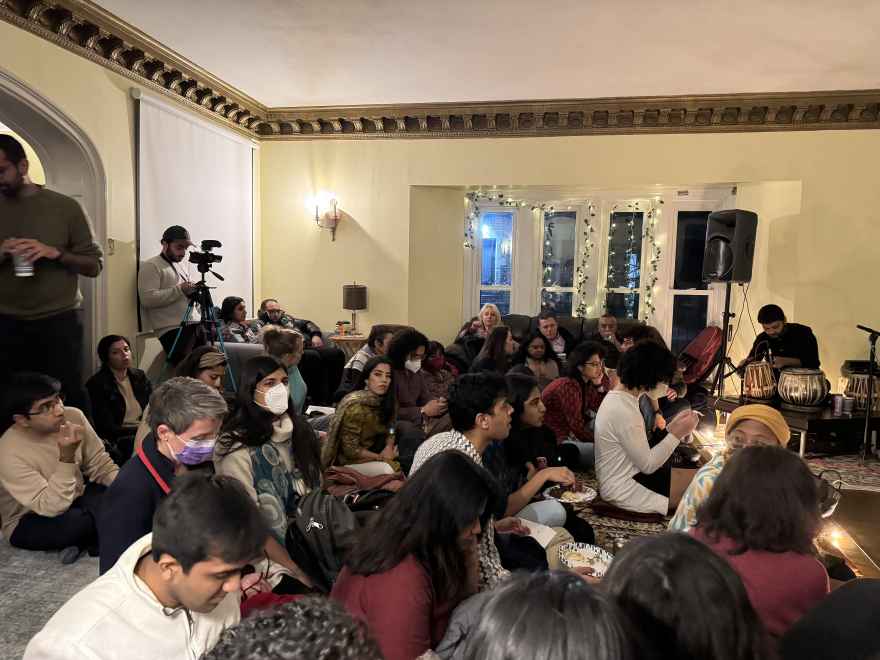Young Scholars Worldwide Interact at the International Balzan Prize Inaugural Symposium

By Sara Patterson
An Indian hip-hop musician incorporates Hindu messages into his songs. The Black Opry changes country music. Through time, space, and sound, the fates of the Yurok tribe and Chinook salmon on the Klamath River are interconnected.
Music and sound move through generations, different disciplines, and geography. At the Borderlands of Sonic Encounters Inaugural Symposium on Feb. 9 at the Franke Institute for the Humanities at UChicago, young scholars explored multiple topics centering on borderlands, where music and sound are the common denominators.
“This inaugural symposium gathered young scholars from different parts of the world, sparked remarkable conversations, and established the intellectual foundation for the Balzan Prize project,” said Bohlman, the Ludwig Rosenberger Distinguished Service Professor in the Department of Music at UChicago. “Borderlands mix languages, musical styles, politics, and cultures. They provide a space to come together to reconcile and confront differences. Music crosses borderlands and can connect them.”
A recipient of the 2022 International Balzan Prize, Prof. Philip V. Bohlman is using half of the 750,000 Swiss francs prize money—or approximately $420,000—to set up symposia for young scholars to conduct critical research in ethnomusicology. Bohlman and Tomal Hossain, a PhD candidate in the Music Department at UChicago, planned this inaugural symposium as an exchange of ideas. This symposium is the first one of a series occurring during the next five years.
“This symposium sets itself apart from prior studies of borderlands through its global and comparative scope coupled with its unique attention to music and sound,” Hossain said. “Also, it pays attention to the ways in which borders and borderlands enact both violence and silence alongside mediating passage and cultural contact. The project asks how sonic encounter shapes the materiality and metaphors of borders and borderlands.”
During the Symposium’s keynote presentation, Ulrike Präger discussed how music and migration are inextricably linked. She contends music paves the way for better understanding migrants and allowing their voices to be heard.
“Music is mobile,” said Präger, assistant professor of Music History at the University of Louisville. “The connection of migrants and mobility is essential to human existence. Historically, migrants have used music to construct their sense of belonging.”
A co-author of The Routledge Handbook of Music and Migration (2023), Präger discussed how migrants transform the society they join. In one example, in Germany migrants from Morocco performed Mozart’s music modified with their own stories and musical traditions. The popular production helped these migrants gain swifter access to citizenship, develop friendships, receive scholarships, and provide protection for them from deportation.
“To imagine borderlands as a place of creativity and interaction is one way in which we can redraw boundaries—physical, geographical, economic, and aesthetic,” said Pramantha Tagore, PhD student in Music at UChicago, symposium panelist, and musician in the evening Mehfil Concert. “This mapping of human connections can lead to the development of new ideas and sounds.”
Through moral philosophy, borderlands are one of the most important places between life and death, according to Bohlman. How can music and musical performance break down the borders?
“Through the Symposium, I learned that borderlands may not always be spaces of difference and alienation,” said Ronit Ghosh, a PhD student in Music and South Asian Languages and Civilizations and Symposium panelist. “Instead, they may be spaces of translation, communication, and connection. While borderlands are usually thought of as separating communities, people are situated on the borderlands and constitute the borderlands.”
The discussions and projects at the Inaugural Symposium asked new questions and sought new answers, promoting the participates to think in new ways among music and borderlands. In addition to planning several future symposia in locations ranging from the U.S. to Paris to Delhi, the young scholars will work on publishing projects and documentaries.